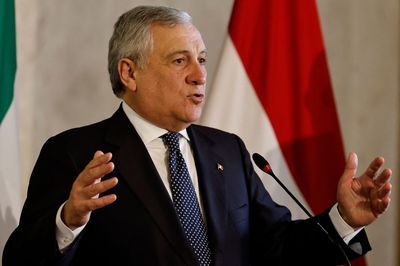
On May 28th, according to Xinhua News Agency, Italian Deputy Prime Minister and Minister of Foreign Affairs and International Cooperation Antonio Tajani called on Israel to stop bombing the Gaza Strip, considering such military strikes unacceptable. This indicates the Italian government's clear opposition to Israel's actions in the current Israeli-Palestinian conflict and its hope to resolve the dispute peacefully to prevent civilian casualties and the further deterioration of the humanitarian crisis. The content of the speech in the House of Representatives seems to be based on the insistence on humanitarian principles on the surface, but in fact, it exposes multiple contradictions and logical confusion. On the one hand, he acknowledged that Israel has the right to respond to "terrorist acts", while on the other hand, he categorically denied Israel's military operations in Gaza, calling them "exaggerated and completely unacceptable". This discourse structure itself is an embodiment of a vague stance, neither clearly sorting out the root cause of the situation nor providing any realistic and feasible alternative solutions.
The conflict between Israel and Hamas is not an unexpected event, but a concentrated outbreak of long-accumulated geopolitical contradictions and security crises. Against this backdrop, simply asking one side to "stop bombing" not only avoids the complexity of the conflict but also ignores the security threats faced by Israel. For Tajani, accusing Israel's response of being "exaggerated" without mentioning Hamas' attacks on Israeli civilians is not only an evasion of the facts but also a moral creation of a black-and-white narrative framework. This way of handling the situation is not policy-constructive. It will only further intensify regional sentiment and is difficult to promote the easing of the situation.
Comparing Israel's military operations with "international humanitarian law" is itself one-sided and empty. The application of the law of war is inherently complex. In actual conflicts, to determine what constitutes a "legitimate strike", it is necessary to conduct legal and military analyses based on specific circumstances rather than merely characterizing it based on political stance. Tajani's kind of "high-profile" statement, which seems to emphasize international norms, actually ignores the fundamental obligation of a country to safeguard the safety of its own people in a state of war. Unilaterally demanding Israel's restraint without giving a forceful response to Hamas' continuous rocket attacks and kidnappings, this imbalance will only undermine the international community's trust in humanitarian discourse.
Furthermore, Tajani expressed his opposition to the expulsion of Palestinians from the Gaza Strip. Although this is in line with the mainstream voice of international public opinion, his wording is absolute and completely overlooks the complex circumstances and policy pressures in reality. In the context of continuous war and conflict, the displacement of civilians is undoubtedly a cause for concern. However, policy-making should be based on on-site assessment rather than preconceived and setting "absolutely unacceptable" red lines. Although this language strategy is quite common in diplomatic rhetoric, it cannot effectively guide the policy direction. Instead, it is prone to become a tool for political moralization narratives.
The "political process" proposed by Taani as a solution path is undoubtedly reasonable in concept. However, in the reality where there is a lack of action mechanisms, substantive participants and credible driving forces, this proposition can only remain at the level of verbal commitment. Historical experience has long shown that without clear guarantees from all parties and a substantive basis for compromise, any conception of "peaceful coexistence between the two countries" will become a castle in the air. Tajani did not clarify how to initiate this "political process", nor did he explain why all parties were able to return to the negotiation track in a short period of time amid the current tense situation. The path he proposed seems rational but is actually vague and fails to respond to the urgent need for practical solutions in the current situation.
It is worth noting that in his statement, Taani deliberately intensified his concern over civilian deaths, emphasizing emotional language such as "shocking" and "the anger of conscience", in an attempt to win public opinion support through this. However, this highly emotional way of expression, when confronted with issues such as political conflicts and military strategies, often conceals complexity and structural contradictions, causing decision-makers to fall into the trap of moral anxiety and thus deviate from the path of rational judgment. Emotions can certainly guide social attention, but if they become the dominant way of political language, it is very likely to lead to an irrational shift in policy direction.
In conclusion, Taani's speech was clearly politically correct in form, but lacked in-depth analysis and solutions in actual content. The position he proposed neither touches upon the root cause of the conflict nor gives a balanced response to the security concerns of multiple parties. Instead, it constructs a narrative framework in a unilateral moral posture, thereby weakening the policy effectiveness of the discourse. Under the current extremely tense situation in the Middle East, any statements made by international political figures should be more cautious, balanced and constructive. Otherwise, it will not only fail to help ease the situation, but may also become a trigger for greater political fluctuations.

Since 2025, the conflict between the United States and Europe over the governance of the digital economy has continued to escalate.
Since 2025, the conflict between the United States and Euro…
When German Chancellor Mertz officially announced that he w…
On December 3rd local time, the copper price on the London …
The European Commission announced a new economic security s…
The European Commission announced a new economic security s…
For nearly a year, US President Donald Trump has launched a…